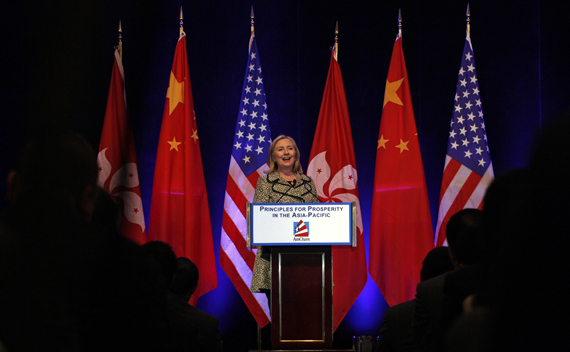Clinton’s “Principles” for Asia-Pacific Prosperity
More on:

Secretary of State Hillary Clinton delivered an important speech in Hong Kong today on “Principles for Prosperity in the Asia-Pacific.” Speaking to the American Chamber of Commerce, she defended a rules-based system of regional economic competition based on openness, freedom, transparency, and fairness. Without mentioning China by name, as the New York Times reports, she cited a litany of worrisome Chinese commercial policies that violate these fundamental principles either in spirit or in substance. She also outlined an encompassing vision of Asia-Pacific economic integration, with the United States at its heart, in contrast to the smaller, China-centric groupings that Beijing has promoted. Unless the Obama administration embraces a more vigorous trade liberalization agenda, however, Clinton’s message may fall on deaf ears.
Clinton’s first goal was to reassure her audience that the United States, despite its fiscal woes, remains fundamental to economic prosperity and regional security in Asia. She emphasized that the United States under the Obama administration “has made a comprehensive commitment to reinvigorate our engagement as a Pacific power—shoring up alliances and friendships, reaching out to emerging partners, and strengthening multilateral institutions.” In sum, the United States is “a resident power in Asia…. And we are here to stay.”
At the same time, Clinton insisted that the global economic crisis has underscored the need to “reach agreement on the rules and principles that will anchor our economic relationships in the coming decades.” Those principles include:
- The Asia-Pacific economic system must be open—shedding rules that restrict trade and create discriminatory markets. Exclusive trading arrangements fragment the regional economy. It is time for a broader Trans-Pacific Partnership that unites the region.
- The regional system must be a free one, in which “ideas, information, products and capital can flow unimpeded by unnecessary or unjust barriers.” Just as the United States seeks to attract foreign investment, so others must be open to U.S. and other foreign capital.
- Economic regulations must be developed transparently and communicated to all parties, rather than conjured up when convenient.
- Finally, rules must be applied fairly to all, since “fairness sustains faith in the system. That faith is difficult to sustain when companies are forced to trade away their intellectual property just to enter or expand in a foreign market, or when vital supply chains are blocked.”
(This last critique was aimed squarely at China, which has alienated investors and trading partners through its “indigenous innovation” policies and its embargo on exporting “rare earth” metals to Japan.)
Clinton’s four principles—which she first articulated at the Asia Pacific Economic Cooperation (APEC) senior ministers’ meetings in Washington in March—are hardly original. They have been part and parcel of the U.S. vision of an open, multilateral system of trade and payments since the end of World War II. Then, as now, the overriding U.S. strategic objective was to prevent the world’s fragmentation into competing, discriminatory economic—and eventually political—blocs.
What is novel in Clinton’s approach is her insistence that developing countries—which have often been granted special treatment—can no longer be exempted from binding rules.
“In fact, all who benefit from open, free, transparent, and fair competition have a vital interest and a responsibility to follow the rules. Enough of the world’s commerce takes place with developing nations, that leaving them out of the rules-based system would render the system unworkable.”
The unmistakable message: no longer can developing nations like China or India plead underdevelopment to skirt multilateral obligations. In trade, as in other realms, they must become responsible stakeholders. The Obama administration will find this an uphill struggle, given emerging power temptations to free ride, but it is a cause worth fighting for.
Furthermore, Secretary Clinton made it clear that the United States considers the inclusive APEC forum—“the premier organization for pursuing economic integration and the growth in the Asia-Pacific”—the most appropriate setting for harmonizing trade rules and leveling the playing field. While celebrating the pending Korea-United States (KORUS) free trade agreement, she cautioned that the emerging “hodgepodge of inconsistent and partial bilateral agreements,” while lowering tariffs, would “also create new inefficiencies and dizzying complexities.” Rather than form new exclusive groupings, “we should aim for true regional integration.”
This November, President Obama will host the annual APEC summit in Hawaii. Secretary Clinton promised her audience that the United States would use that occasion to flesh out the Trans-Pacific Partnership, envisioned as an eventual “free trade area of the Asia Pacific.” Coming up with a credible U.S. vision will be a tall order, however, given the U.S. electoral calendar and jobless recovery. The president’s political base—and the Democratic caucus on Capitol Hill—remains deeply protectionist, and Congress has not even been able to pass KORUS and two other modest bilateral trade bills with Panama and Colombia.
In her Hong Kong speech, Secretary Clinton lionized Harry Truman and George Marshall for their enlightened leadership after World War II, in convincing congress and U.S. citizens to take difficult steps. Restoring U.S. trade leadership—both in the Asia-Pacific and globally—will require similar courage.
More on:
 Online Store
Online Store
